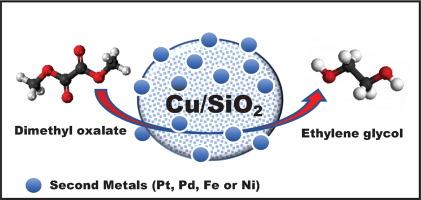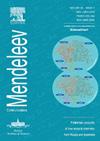提高基于硅酸铜的双金属催化剂在草酸二甲酯加氢制乙二醇过程中的性能
IF 1.7
4区 化学
Q3 CHEMISTRY, MULTIDISCIPLINARY
引用次数: 0
摘要
研究了第二种金属(铂、钯、镍和铁)在 160-200 °C条件下将草酸二甲酯选择性氢化为乙二醇的过程中对硅酸铜催化剂活性的影响。采用 XRD、DRIFTS-CO 和 TEM 方法对制备的催化剂进行了表征。在 200 ℃ 时,10Fe/10Cu-PhySi 催化剂的转化率为 68%;同时,在 180 ℃ 时,双金属 1Pt/Cu-PhySi 催化剂的完全转化率为 98%,选择性为 98%。本文章由计算机程序翻译,如有差异,请以英文原文为准。

Enhanced performance of bimetallic catalysts based on copper phyllosilicate in the hydrogenation of dimethyl oxalate to ethylene glycol
The effect of the second metal (Pt, Pd, Ni and Fe) on the activity of copper phyllosilicate-based catalysts was investigated in the selective hydrogenation of dimethyl oxalate to ethylene glycol at 160–200 °C. The prepared catalysts were characterized by XRD, DRIFTS-CO and TEM methods. The conversion achieved over 10Fe/10Cu-PhySi catalyst was 68 % at 200 °C; at the same time, the full conversion with selectivity 98% was obtained at the temperature of 180 °C over a bimetallic 1Pt/Cu-PhySi catalyst.
求助全文
通过发布文献求助,成功后即可免费获取论文全文。
去求助
来源期刊

Mendeleev Communications
化学-化学综合
CiteScore
3.00
自引率
21.10%
发文量
226
审稿时长
4-8 weeks
期刊介绍:
Mendeleev Communications is the journal of the Russian Academy of Sciences, launched jointly by the Academy of Sciences of the USSR and the Royal Society of Chemistry (United Kingdom) in 1991. Starting from 1st January 2007, Elsevier is the new publishing partner of Mendeleev Communications.
Mendeleev Communications publishes short communications in chemistry. The journal primarily features papers from the Russian Federation and the other states of the former USSR. However, it also includes papers by authors from other parts of the world. Mendeleev Communications is not a translated journal, but instead is published directly in English. The International Editorial Board is composed of eminent scientists who provide advice on refereeing policy.
 求助内容:
求助内容: 应助结果提醒方式:
应助结果提醒方式:


